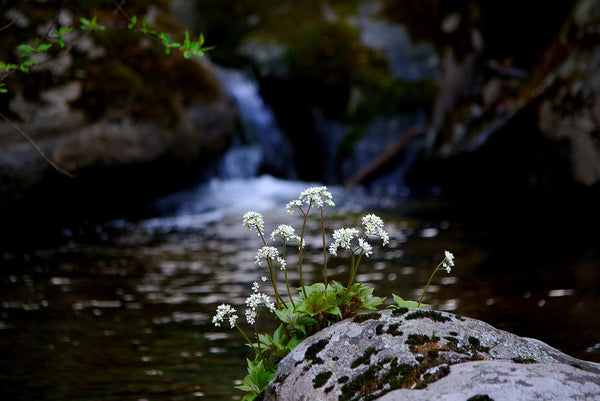"Water is the mother of all tea",
- old Chinese proverb.
It's pretty obvious how important water is to the process of brewing tea. After all, the only three absolutely necessary components are a container of some sorts, water, and the tea leaves. But water is usually disregarded as being less diverse than it really is, therefore discredited as a monotonous staple. Taking a closer look at what denotes water quality will hopefully increase every tea drinker's consideration of its importance to the flavor and texture of a cup of tea.

"Slow moving mountain water is of the highest quality, followed by river water, then well water."
- Lu Yu, writer of the Ch'a Ching tea encyclopedia.
Let's first take a look at the Ph value of water. Less acidic or alkaline, has a Ph value of 8 or above, while acidic water has Ph values of 6 or lower. Completely neutral water has a Ph level of exactly 7 and is the ideal starting point for tea. Usually both tap and spring water are alkaline, and often made so to avoid pipe corrosion.
In general, acidic water is more efficient at revealing flavor compounds of tea and extracts more flavor at a faster rate compared to alkaline water.
That is to say however, if your tea's strength and color outweighs its flavor, acidic water would not be the best option! Match slower brewing teas with acidic water.
Mineral content is another great influence on water quality. 'Hard' water contains more minerals than 'soft' water such as sodium, magnesium etc. These greatly influence the water's taste and texture and don't suit tea so well. Some clues, aside from a salty taste or bleachy smell, include cloudiness and surface scum.

The last two noteworthy topics are water oxygen levels and starting temperature.
The fresher the water, the more oxygen it will contain. Healthy oxygen amounts in water aerate tea leaves which contribute to proper infusion and full-bodied brews.
Water that has been standing for several hours or has already been boiled will have less oxygen and would not be best for tea. Also, cold water is always best used for tea and cooking in order to avoid unwanted compounds often introduced by heating systems.
And if you're like most people - forced to use tap water and can't afford the most expensive reverse osmosis purification system, no problem! Try to get your hands on activated charcoal instead. It's a natural, harmless and flavorless mineral which removes a myriad of toxic and other unwanted compounds from water, while keeping all the good stuff.
Now that you have all you need to know about the kind of water that is best for tea, check here for some old-school tips on controlling water temperature for each tea type.